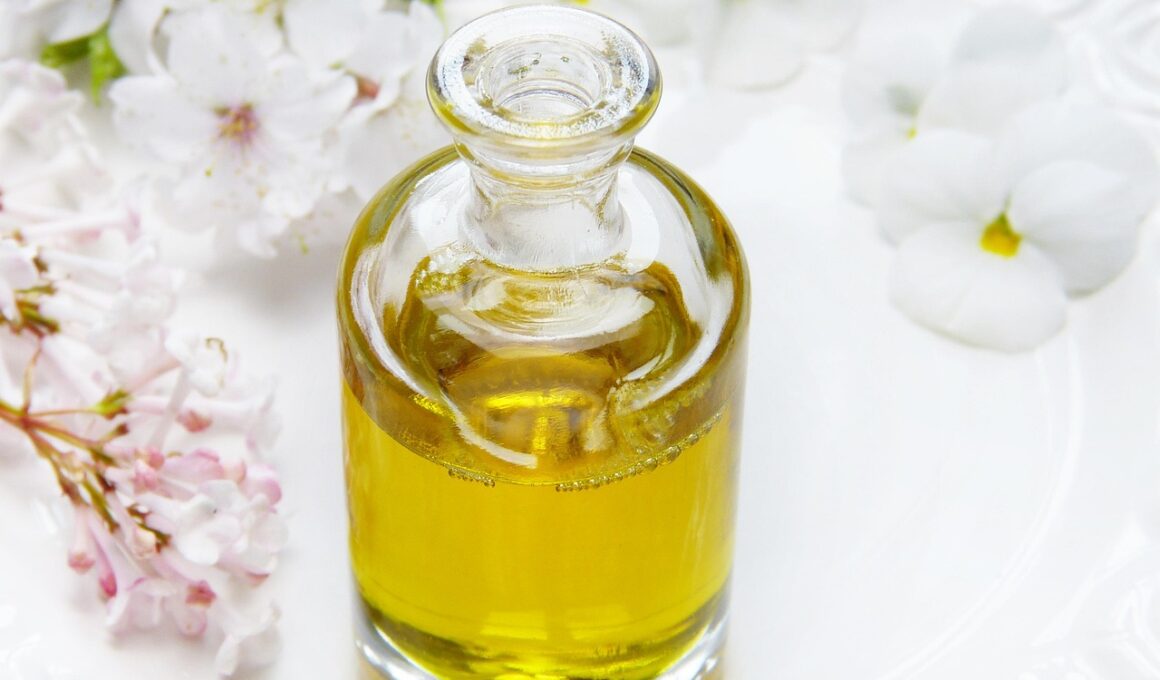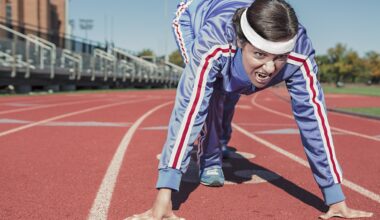How Aromatherapy Supports Physical Recovery After Exercise
Aromatherapy is one of the most vital techniques that integrates the power of essential oils to enhance the recovery process after physical exercise. The application of specific scents can influence mood, promote relaxation, and ease muscle tension, all contributing to a smooth recovery. Essential oils like lavender, eucalyptus, and peppermint are widely recognized for their therapeutic benefits. Lavender, for instance, is well-known for its calming effects, which can mitigate post-exercise stress and facilitate restful sleep. Eucalyptus oil, on the other hand, can assist in clearing the airways, thus enhancing respiratory function after strenuous workouts. Moreover, peppermint oil may invigorate physical performance and support pain relief by reducing muscle fatigue. Incorporating these oils into a post-workout routine can mean using them in diffusers, topical applications, or baths. Ultimately, by leveraging the natural benefits of aromatherapy, individuals can utilize these powerful sensory tools to support not only their physical recovery but also their mental well-being after engaging in strenuous physical activities.
One key aspect to consider is the method of application when using aromatherapy for recovery. Essential oils can be used in several ways; inhalation through a diffuser in the recovery space helps establish a soothing atmosphere. Topical application, however, directly onto sore muscles can provide deep relief. This technique involves diluting essential oils with a carrier oil, such as coconut or jojoba oil, before applying it to the skin, as concentrated essential oils can cause irritation. Always conduct a patch test to ensure no allergic reactions occur. Bathing in warm water with added essential oils can relax both the body and mind, enhancing the recovery process. Combining these applications with other recovery modalities, like hydration and nutrition, can optimize results. A holistic approach to recovery magnifies the benefits of aromatherapy and accelerates healing from intense exercise. Additionally, using aroma as a part of recovery rituals can condition the mind to associate specific scents with relaxation and recovery. This creates a powerful psychological component, making post-exercise routines more effective.
The Science Behind Aromatherapy and Muscle Recovery
Emerging studies suggest that aromatherapy can support physical recovery not just through sensory perception, but also by influencing physiological responses. Essential oils contain various compounds like terpenes and phenols, which research indicates may aid in reducing inflammation, improve circulation, and alleviate pain. For instance, eucalyptus oil is noted for its anti-inflammatory properties; according to some studies, inhalation can influence the body’s inflammatory response beneficially. Additionally, lemon and grapefruit oils are believed to enhance mood and energy levels, counteracting feelings of fatigue that often accompany rigorous workouts. As these oils enter the bloodstream through the skin or respiratory system, they can exert systemic effects, potentially promoting a more efficient recovery process. Furthermore, inhaling these scents activates certain brain regions linked to emotional regulation, stress relief, and pleasure. This interplay between aroma and body chemistry highlights the power of aromatherapy as a comprehensive method for recovering from the physical rigors of exercise, allowing for enhanced performance in future workouts.
Your environment plays a significant role in recovery, and aromatherapy can help create a healing atmosphere. Setting up a dedicated recovery space infused with relaxing scents can work wonders for your mental state. Simple additions like essential oil diffusers or scented candles can improve the overall ambiance, turning the recovery process into a more enjoyable ritual. Engaging your senses with calming aromas contributes to relaxation and can significantly reduce recovery time by decreasing stress levels. When the mind is at rest, the body follows suit, allowing for uninterrupted healing. Pairing these scents with calming music and dim lighting further enhances the recovery experience by creating an environment conducive to relaxation. These factors combined help in maintaining focus on recovery rather than distractions. Moreover, creating a personal recovery routine paired with aromatherapy encourages consistency, which is crucial for long-term body maintenance. Establishing daily or weekly practices involving specific essential oils may encourage mindfulness and emotional balance, crucial components for recovering from physical exertion. Regardless of your fitness level, integrating scents into your routine can be beneficial.
Choosing the Right Oils for Optimal Recovery
When selecting essential oils for post-exercise recovery, it’s important to consider your personal preferences and specific recovery needs. Not every oil works universally for everyone; fragrance preferences vary significantly, impacting its efficacy based on emotional responses. For individuals focusing on muscle tension relief, oils like rosemary and ginger may prove beneficial. Rosemary oil, known for enhancing circulation, aids in reducing muscle soreness by increasing blood flow. Conversely, ginger has warming properties that can soothe muscle stiffness. Those experiencing mental fatigue might find scents like bergamot and chamomile more effective for their calming effects, thus promoting relaxation and reducing anxiety. Adding a range of different oils to your recovery toolkit allows you to customize each recovery session based on how you feel that day. Experimenting with blends can lead to discovering unique combinations that may work even better. For this purpose, consider creating a unique blend of oils tailored specifically for you which you may diffuse, apply, or incorporate into your relaxation practices.
Moreover, essential oils can also enhance your overall training experience when used during workouts. Inhalation of energizing scents can increase alertness and mental clarity, leading to improved performance. Oils such as peppermint and citrus blends are invigorating, helping to reduce the perception of effort during exercise, which can be crucial for pushing through challenging workouts. Incorporating these oils into your pre-workout regimen can create a positive association with specific scents and a sense of motivation, thus enhancing your training sessions. Post-workout, combining oils with a light massage can stimulate muscles and encourage relaxation. It’s vital to note, though, that aromatherapy should be viewed as a complementary strategy rather than a substitute for other recovery practices like hydration, stretching, and nutrition. Each element plays a critical role in recovery, maximizing the potential benefits of aromatherapy. Establishing a comprehensive recovery strategy that includes aromatherapy can help individuals capitalize on their physical efforts and promote well-rounded wellness and performance improvement.
Conclusion: Embracing Aromatherapy in Recovery
Ultimately, embracing aromatherapy as part of a recovery process after exercise can lead to multifaceted benefits, enhancing both physical and emotional well-being. By creating a sensory environment conducive to relaxation, individuals can facilitate quicker muscle recovery and improve mental clarity. The comforting scents transform recovery into an empowering experience, instilling a stronger connection between body and mind. Establishing a calming routine facilitates the absorption of essential oils, allowing their natural healing properties to work effectively. Aromatherapy encourages practitioners to slow down and prioritize recovery, fostering greater self-care awareness and promoting healthier lifestyles. Given its numerous advantages and possibilities for customization, aromatherapy deserves a place in any serious fitness enthusiast’s recovery toolkit. Integrating these scents into your routine can be a delightful exploration, leading to newfound appreciation for both the physical body and mental state ensuring you’re fully equipped for future physical challenges. So, the next time you finish a workout, consider spending some time with your favorite essential oils. Your body and mind will thank you for it.


